Related Research Articles

A listed building, or listed structure, is one that has been placed on one of the four statutory lists maintained by Historic England in England, Historic Environment Scotland in Scotland, Cadw in Wales, and the Northern Ireland Environment Agency in Northern Ireland.

Lingfield is a village and civil parish in the Tandridge district of Surrey, England, approximately 23 miles (37 km) south of London. Several buildings date from the Tudor period and the timber-frame medieval church is Grade I listed. The stone cage or old gaol, constructed in 1773, was last used in 1882 to hold a poacher.
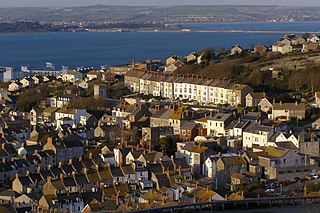
Fortuneswell is a village in Underhill on the Isle of Portland, in Dorset, England. It lies on steeply sloping land on the northern edge of the island, known as Underhill, where Chesil Beach connects the island to the mainland. Adjoining Fortuneswell are Chiswell to the west and Castletown to the north. Fortuneswell occupies the steeper land above sea level, whereas Chiswell and Castletown occupy flat land close to sea level, next to Chesil Beach and Portland Harbour respectively. Fortuneswell has a main shopping street, and along with Easton, is the main hub of the island's activities.

Easton is a village on the Isle of Portland in Dorset, England. The village is situated at Tophill, within the centre of the island. As with the rest of Portland's villages and settlements, Easton, including the settlements Reforne and Straits, has been designated as a conservation area, as it is a place of special architectural and historic interest. Easton, Wakeham and Reforne were designated pre-1974.

Wakeham is a hamlet near the village of Easton, in Tophill on the Isle of Portland in Dorset, England. It is situated between the Straits part of Easton, and Pennsylvania Castle. As with the rest of Portland's villages and settlements, Wakeham has been designated as a conservation area, as it is a place of special architectural and historic interest. Easton, Wakeham and Reforne were designated pre-1974. The hamlet features a distinctively wide road running through it, once built to allow space for horse-drawn carts transporting stone by road. Many of Wakeham's older buildings of the 17th and 18th century survive.
Weston is a village in Tophill on the Isle of Portland, Dorset, England. It abuts the main village Easton. As with the rest of Portland's villages and settlements, Weston has been designated as a conservation area, as it is a place of special architectural and historic interest. The village was designated in 1994.

Castletown is a small village in Underhill on the Isle of Portland in Dorset. It is located close to Fortuneswell, on the shores of Portland Harbour, and includes a sandy beach, as well as one of Portland's notable highlights; Portland Castle, while the Weymouth and Portland National Sailing Academy is also located nearby.

Chartham is a village and civil parish in the Canterbury district of Kent, England. It is situated on the Ashford side of the city, and is in the North Downs area of Outstanding Natural Beauty, 2.3 mi (4 km) south west of Canterbury, England. The Great Stour Way path passes through the village. A paper mill in the village has specialised in the production of tracing paper since 1938. There are numerous arable farms and orchards in the parish. The village has an unmanned station, Chartham, and a manned level crossing. It has an outlying locality sharing in many of the community resources, Chartham Hatch.

Aldington is a village and civil parish in the Ashford District of Kent, England. The village centre is eight miles (12 km) south-east of the town of Ashford. As with the village centre, set on a steep escarpment above agricultural Romney Marsh and the upper Stour is Aldington Knoll, which was used as a Roman burial barrow and later beacon, it has a panorama towards the English Channel and of low land such as Dungeness. At the 2011 Census the population included Bonnington.

Ashford-in-the-Water is a village and civil parish in the Derbyshire Peak District, England. The village is on the River Wye, 2 miles (3 km) north-west of Bakewell. It is known for the quarrying of Ashford Black Marble, and for the maidens' garlands made to mark the deaths of virgins in the village until 1801. Some of these are preserved in the parish church. The civil parish population taken at the 2011 Census was 559.
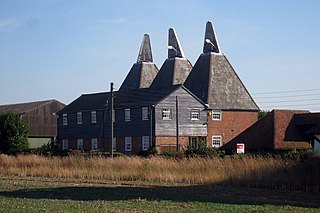
Sheldwich is a village and civil parish in the far south of the Borough of Swale in Kent, England.
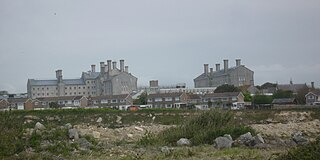
HM Prison Portland is a male Adult/Young Offenders Institution in the village of The Grove on the Isle of Portland, in Dorset, England. It is operated by Her Majesty's Prison Service. The prison was originally opened in 1848 as an adult convict establishment, before becoming a Borstal in 1921, and a YOI in 1988. In 2011 it became an Adult/Young Offenders establishment.

There are 12 Grade I listed buildings in Forest Heath, a non-metropolitan district of Suffolk, England.

There are 51 Grade I listed buildings in Waveney, a former non-metropolitan district of in the county of Suffolk in England.
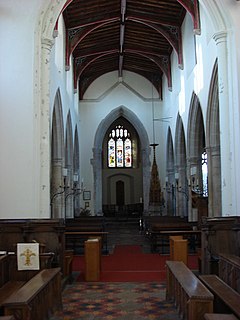
There are many Grade I listed buildings in Babergh, a non-metropolitan district of in the county of Suffolk in England.

Blackpool is a seaside town and unitary authority situated on The Fylde coast in Lancashire, England. This list includes the listed buildings in Blackpool and Bispham, a village within the borough of Blackpool. One is classified by English Heritage as being in Grade I and five in Grade II*. In the United Kingdom, the term "listed building" refers to a building or other structure officially designated as being of special architectural, historical or cultural significance. These buildings are in three grades: Grade I consists of buildings of outstanding architectural or historical interest; Grade II* includes particularly significant buildings of more than local interest; Grade II consists of buildings of special architectural or historical interest. Buildings in England are listed by the Secretary of State for Culture, Media and Sport on recommendations provided by English Heritage, which also determines the grading.

Poulton-le-Fylde is a market town in the Wyre district of Lancashire, England, situated on a coastal plain called the Fylde. There are 16 buildings and structures in the town which have been listed by the Secretary of State for Culture, Olympics, Media and Sport as being of special architectural, historical or cultural significance. One is classified as Grade II*, and the rest as Grade II; Poulton-le-Fylde has no Grade I listed buildings. The Grade II* designation is for St Chad's Church. There is written evidence of a church on the site since 1094, although it may have been built earlier. It became the Anglican parish church at the time of the Reformation and was largely rebuilt in the 18th century.
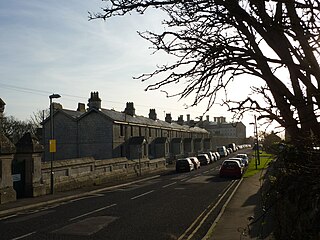
The Grove is a small village located at Tophill on the Isle of Portland in Dorset. The village is found close to the larger village Easton, and is most notable for containing the Youth Offender's Institute HM Prison Portland, including its museum Grove Prison Museum. As with the rest of Portland's villages and settlements, The Grove has been designated as a conservation area, as it is a place of special architectural and historic interest. The village was designated in 1981.
In total there are 317 listed buildings in the city of Southampton, of which 14 are Grade I, 20 are Grade II* and the remainder Grade II.

There are 48 Grade I listed buildings in Greater Manchester, England. In the United Kingdom, the term listed building refers to a building or other structure officially designated as being of special architectural, historical or cultural significance; Grade I structures are those considered to be "buildings of exceptional interest". In England, the authority for listing under the Planning Act 1990 rests with Historic England, a non-departmental public body sponsored by the Department for Culture, Media and Sport.
References
- ↑ "Listed buildings". Ashford Borough Council. Retrieved 27 October 2019.
- ↑ Historic England (27 November 1957). "Church of All Saints (1299904)". National Heritage List for England . Retrieved 27 October 2019.
- ↑ Historic England (24 September 1951). "Details from listed building database (1071054)". National Heritage List for England . Retrieved 27 October 2019.
- ↑ Historic England (4 June 1976). "Details from listed building database (1362852)". National Heritage List for England . Retrieved 27 October 2019.
- ↑ Historic England (4 June 1976). "Details from listed building database (1184430)". National Heritage List for England . Retrieved 27 October 2019.
- ↑ Historic England (15 April 1975). "Details from listed building database (1071093)". National Heritage List for England . Retrieved 27 October 2019.
- ↑ Historic England (4 June 1976). "Details from listed building database (1071089)". National Heritage List for England . Retrieved 27 October 2019.
- ↑ Historic England (24 September 1951). "Details from listed building database (1071094)". National Heritage List for England . Retrieved 27 October 2019.
- ↑ Historic England (24 September 1951). "Parish Church of St Mary the Virgin (1071114)". National Heritage List for England . Retrieved 27 October 2019.
- ↑ Historic England (4 June 1976). "Tank situated in centre of New Street (1184646)". National Heritage List for England . Retrieved 27 October 2019.
- ↑ Historic England (24 September 1951). "Willesborough Windmill (1184561)". National Heritage List for England . Retrieved 27 October 2019.